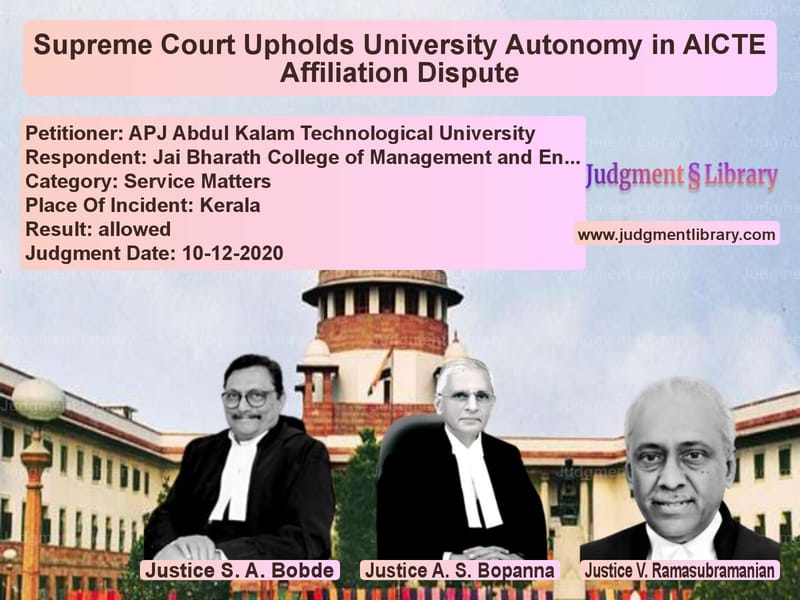Supreme Court Upholds University Autonomy in AICTE Affiliation Dispute
The Supreme Court of India, in its judgment in APJ Abdul Kalam Technological University vs. Jai Bharath College of Management and Engineering Technology, addressed a significant legal question regarding university affiliation procedures and the role of the All India Council for Technical Education (AICTE). The case revolved around whether a university could impose additional requirements for affiliation beyond AICTE’s regulations, affecting the introduction of new engineering courses.
Background of the Case
Jai Bharath College of Management and Engineering Technology, a private institution in Kerala, sought affiliation from APJ Abdul Kalam Technological University for introducing a B.Tech program in Artificial Intelligence and Data Science. The college obtained the necessary approval from AICTE but faced rejection from the university, citing specific internal norms. The core legal issue was whether a university has the authority to prescribe additional criteria for affiliation beyond the AICTE framework.
Key Facts of the Case
- The petitioner, Jai Bharath College, applied for affiliation in 2020 to introduce a specialized B.Tech course.
- AICTE, the regulatory body for technical education in India, granted approval for the program.
- APJ Abdul Kalam Technological University denied affiliation, arguing that the college did not meet certain additional internal requirements.
- The college challenged the university’s decision before the Kerala High Court, which ruled in favor of the college.
- The university subsequently appealed to the Supreme Court.
Petitioner’s Arguments
The university defended its decision, arguing:
- AICTE approval alone does not automatically guarantee affiliation.
- As an autonomous academic body, the university has the right to impose higher academic standards.
- The institution failed to meet certain internal benchmarks regarding faculty qualifications, infrastructure, and student intake.
- Universities have a duty to maintain academic excellence and cannot be compelled to affiliate substandard institutions.
Respondent’s Arguments
Jai Bharath College contended:
- Once AICTE approval is granted, the university has no discretion to impose additional criteria.
- The denial of affiliation was arbitrary and contrary to AICTE’s mandate.
- The university’s decision violated students’ right to education by restricting access to new educational programs.
- The High Court was correct in ruling that the university overstepped its authority.
Supreme Court’s Observations
The Supreme Court, in its judgment delivered by Justices S. A. Bobde, A. S. Bopanna, and V. Ramasubramanian, made several key observations:
1. Universities’ Right to Set Higher Standards
The Court ruled that universities have the legal authority to set academic benchmarks higher than AICTE regulations.
“The role of AICTE is to ensure minimum standards. Universities, as autonomous bodies, are entitled to set stricter criteria to uphold academic excellence.”
2. AICTE’s Mandate vs. University Autonomy
The Court clarified that AICTE’s approval only ensures eligibility but does not override university regulations.
“Affiliation is a separate process, distinct from regulatory approval. Universities retain the discretion to assess institutions beyond AICTE’s guidelines.”
3. Importance of Faculty and Infrastructure
The Court emphasized that a university’s right to assess faculty qualifications, student intake, and infrastructure cannot be diluted.
“Mere AICTE approval does not automatically ensure the availability of qualified faculty, infrastructure, and student preparedness.”
4. Kerala High Court’s Error
The Court found that the High Court wrongly equated AICTE approval with an obligation to grant affiliation.
“The High Court failed to appreciate the distinction between regulatory approval and academic autonomy.”
Final Judgment
- The Supreme Court overturned the Kerala High Court’s ruling.
- The university’s decision to deny affiliation was upheld.
- AICTE approval was deemed insufficient for automatic affiliation.
- The institution was directed to reapply for affiliation after meeting the university’s criteria.
Implications of the Judgment
This ruling has significant implications:
- Reinforces university autonomy in setting academic standards.
- Clarifies that AICTE approval does not override university regulations.
- Ensures institutions maintain higher educational quality before gaining affiliation.
- Prevents dilution of academic integrity by mandating stricter faculty and infrastructure requirements.
The Supreme Court’s judgment reaffirms the importance of maintaining rigorous academic standards while balancing regulatory oversight and university autonomy.
Petitioner Name: APJ Abdul Kalam Technological University.Respondent Name: Jai Bharath College of Management and Engineering Technology.Judgment By: Justice S. A. Bobde, Justice A. S. Bopanna, Justice V. Ramasubramanian.Place Of Incident: Kerala.Judgment Date: 10-12-2020.
Don’t miss out on the full details! Download the complete judgment in PDF format below and gain valuable insights instantly!
Download Judgment: APJ Abdul Kalam Tech vs Jai Bharath College Supreme Court of India Judgment Dated 10-12-2020.pdf
Direct Downlaod Judgment: Direct downlaod this Judgment
See all petitions in Education Related Cases
See all petitions in Judgment by S. A. Bobde
See all petitions in Judgment by A. S. Bopanna
See all petitions in Judgment by V. Ramasubramanian
See all petitions in allowed
See all petitions in supreme court of India judgments December 2020
See all petitions in 2020 judgments
See all posts in Service Matters Category
See all allowed petitions in Service Matters Category
See all Dismissed petitions in Service Matters Category
See all partially allowed petitions in Service Matters Category







